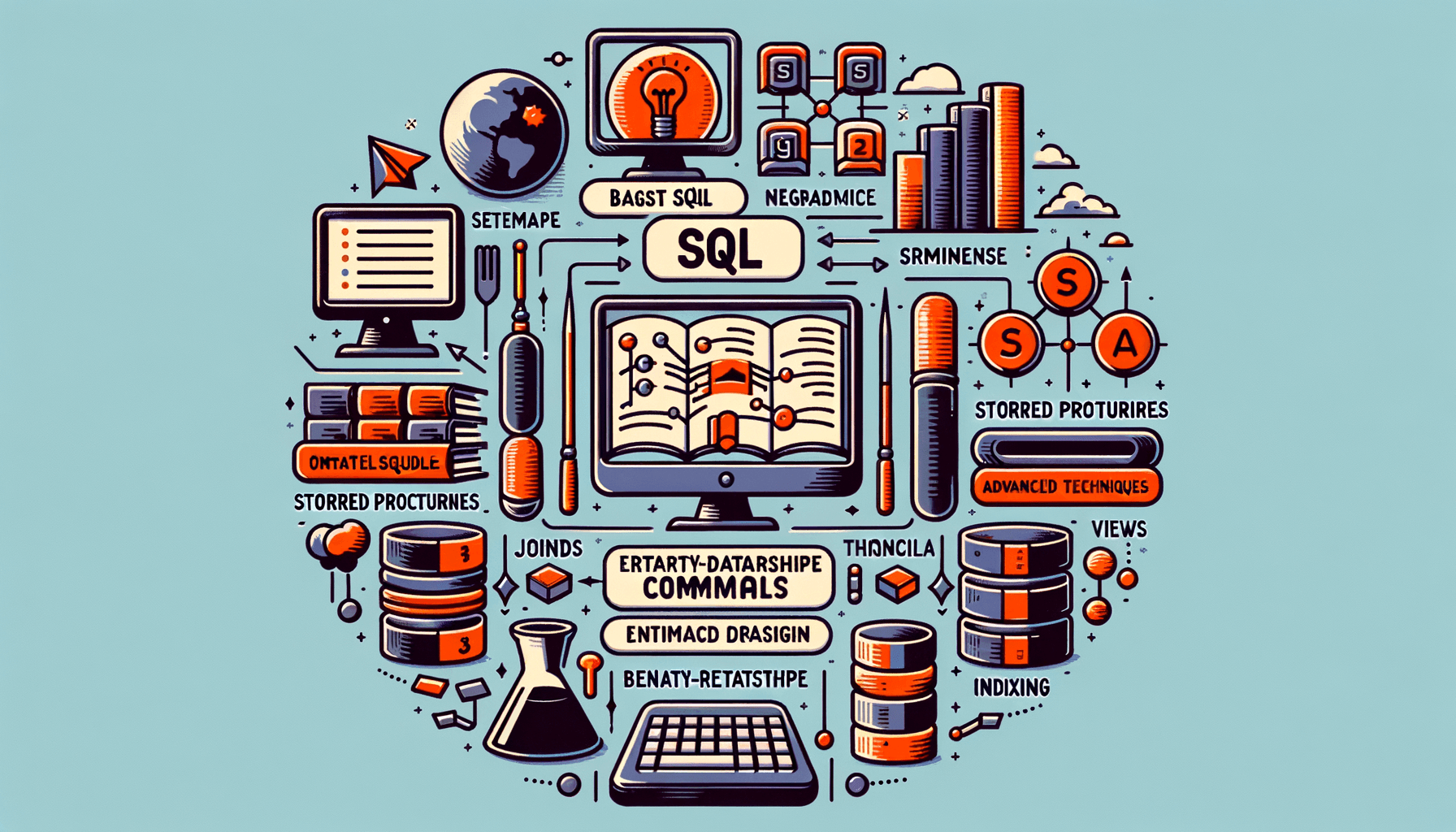A big variety of articles and resources

Mastering SQL: Your Guide to Effective Data Analysis
 Sia Author and Instructor
Learn SQL
Sia Author and Instructor
Learn SQL
8 minute read
The Importance of SQL in Data Analysis
Why SQL is Essential for Data Analysts
SQL is the bedrock for data analysts, providing a robust framework for data extraction, manipulation, and analysis. Its structured nature ensures data integrity and reliability, which are crucial for predictive analytics. SQL databases support complex queries and transactions, making them indispensable for detailed data analysis and reporting. The ability to define clear schemas further enhances its utility in maintaining data quality.
Common SQL Use Cases in Data Analysis
SQL's versatility is evident in its wide range of applications. From querying customer databases to identify high-value clients to aggregating patient data in healthcare analytics projects, SQL proves its indispensability. For instance, in a healthcare project, SQL was used to aggregate patient data from various sources, enabling analysts to identify patterns in patient admissions and outcomes. This capability to handle real-world problems with expert-led training makes SQL a preferred choice for many analysts.
Comparing SQL with Other Data Analysis Tools
While the data analysis toolbox includes various technologies, SQL remains unmatched in certain aspects. Its simplicity and powerful query capabilities make it a preferred choice for handling structured data over tools like Python's pandas or R's data frames. Unlike these programming languages that require extensive coding for data manipulation, SQL's declarative nature allows for complex queries to be executed with minimal syntax. This efficiency in data preparation and quality control is why many data analysts continue to rely on SQL.
Fundamental SQL Skills for Data Analysis
Basic SQL Commands Every Analyst Should Know
Every data analyst must be proficient in basic SQL commands. These commands form the foundation of data manipulation and retrieval. Mastering these commands is crucial for any data analysis task. Key commands include SELECT, INSERT, UPDATE, and DELETE. These operations, often referred to as CRUD (Create, Read, Update, Delete), are essential for interacting with databases.
Understanding Joins and Relationships
Joins are fundamental in SQL for combining data from multiple tables. Understanding the different types of joins—such as INNER JOIN, LEFT JOIN, RIGHT JOIN, and FULL JOIN—is essential for effective data analysis. These joins help in establishing relationships between tables, enabling analysts to derive meaningful insights from complex datasets.
Using Aggregation Functions Effectively
Aggregation functions like SUM, AVG, COUNT, MIN, and MAX are powerful tools in SQL. They allow analysts to perform calculations on data sets, providing valuable summaries and insights. Effectively using these functions can significantly enhance the quality of your data analysis.
Enhance SQL skills with advanced functions and techniques. Gain a competitive edge in BI. Practical skills enhancement through real-world problems and expert-led training.
Optimizing SQL Queries for Performance
Efficiency is crucial when handling large datasets, making the optimization of SQL queries an essential skill. The aim is to minimize execution time and resource consumption, ensuring swift and responsive data analysis. Strategies for query optimization include:
Writing Efficient SQL Queries
Crafting efficient SQL queries is at the heart of effective database management. The speed and performance of your data retrieval largely depend on how well your SQL queries are written. SELECT statements should be as specific as possible to avoid unnecessary data loading. Using wildcard characters in the SELECT statement can slow down your database. Additionally, limit your query results with WHERE and LIMIT statements to avoid retrieving more data than necessary.
Indexing Strategies for Faster Query Execution
As data volumes grow, the efficiency of SQL queries becomes paramount. Indexing is a primary tool in this endeavor, drastically reducing query times by allowing the database to pinpoint data without scanning each row. Proper indexing can make a significant difference in performance, especially in large databases.
Troubleshooting Common Performance Issues
When dealing with query inefficiencies, consider examining your SQL code thoroughly. Look for opportunities to remove unnecessary JOIN operations or redundant conditions from your WHERE clause. Also, note whether your subqueries could be replaced with JOINs for better performance.
In a mini course: SQL Essentials - Performance Optimization, you can learn about data architecture and agile practitioner techniques. Training programs for database management skills are available, including a free SQL course.
Advanced SQL Techniques for Data Analysis
Building upon foundational skills, this section delves into the sophisticated realms of SQL, unlocking techniques pivotal for in-depth data analysis and the extraction of nuanced insights. From the power of window functions to the strategic optimization of queries, we chart a path toward transforming raw data into predictive foresights.
Practical Tips for Mastering SQL
Mastering SQL can unlock immense power for data analysts seeking to elevate their querying abilities. Practical strategies and tips for improving SQL proficiency include writing optimized queries and leveraging advanced features. Indexing and performance tuning can significantly enhance the speed and efficiency of SQL queries. Troubleshooting common SQL issues like performance bottlenecks and data integrity challenges is essential for smooth operations.
SQL in the Context of Data Science
Integrating SQL with Data Science Workflows
In the data-driven landscape of today, SQL emerges as an indispensable tool for data scientists. It facilitates a myriad of operations such as data extraction, manipulation, and analysis with unparalleled ease and efficiency. Understanding how to leverage SQL in conjunction with big data technologies allows data scientists to tackle complex data challenges at scale. This integration is crucial for transforming raw data into actionable insights.
SQL for Big Data Analysis
SQL databases support complex queries and transactions, making them indispensable for scenarios requiring detailed data analysis and reporting. Their structured nature facilitates a clear schema definition, which is crucial for data integrity and reliability in predictive analytics. By combining SQL with big data technologies, data scientists can efficiently manage and analyze vast datasets.
Case Studies of SQL in Data Science Projects
In the dynamic world of data science, SQL stands not just as a language but as a bridge connecting raw data to actionable insights. This section delves into the practicality of SQL in real-world data science projects, offering a lens through which to view its application, integration, and effectiveness. Through case studies and discussions on tool integration, we aim to illuminate the path for aspiring data scientists to see how SQL is not just learned but applied.
SQL in the Context of Data Science is a crucial skill for any aspiring data scientist. Our comprehensive courses are designed to help you master SQL and other advanced technologies, with the support of artificial intelligence for a tailored learning experience. Don't miss out on the opportunity to advance your career.
Conclusion
Mastering SQL unlocks immense power for data analysts seeking to elevate their querying abilities and streamline data analysis processes. Despite its necessity, many still struggle with the language's ins and outs. You don’t have to go at it alone, though. This guide has provided practical strategies and tips for improving SQL proficiency, from writing optimized queries to leveraging advanced features. By focusing on indexing and performance tuning, you can significantly enhance the speed and efficiency of your SQL queries. Troubleshooting common SQL issues like performance bottlenecks and data integrity challenges is essential for smooth operations. Remember, mastering SQL is a journey that involves continuous learning and practice. With dedication and the right resources, you can achieve data querying excellence and unlock new insights and efficiencies in your work.
Frequently Asked Questions
What is SQL and why is it important for data analysis?
SQL, or Structured Query Language, is a standardized programming language used to manage and manipulate databases. It is essential for data analysis because it allows analysts to efficiently query, update, and manage large datasets, enabling them to extract valuable insights and make informed decisions.
What are some common use cases of SQL in data analysis?
Common use cases of SQL in data analysis include data retrieval, data cleaning, data transformation, and data aggregation. SQL is also used for creating reports, performing statistical analysis, and integrating with other data tools and platforms.
How does SQL compare with other data analysis tools?
SQL is unique in its ability to directly interact with relational databases, making it highly efficient for querying structured data. While other tools like Python and R offer advanced statistical and machine learning capabilities, SQL remains the foundational tool for database management and quick data retrieval.
What are some basic SQL commands every analyst should know?
Every analyst should be familiar with basic SQL commands such as SELECT, INSERT, UPDATE, DELETE, and WHERE. These commands are fundamental for querying data, modifying records, and filtering results based on specific conditions.
How can I optimize my SQL queries for better performance?
To optimize SQL queries, you can use indexing to speed up data retrieval, avoid using SELECT *, limit the use of subqueries, and ensure proper join operations. Additionally, analyzing query execution plans can help identify and address performance bottlenecks.
What resources are available for learning and mastering SQL?
There are numerous resources available for learning SQL, including online courses, tutorials, documentation, and books. Websites like Codecademy, Coursera, and Khan Academy offer structured courses, while platforms like Stack Overflow and SQLZoo provide community support and practice exercises.
Related Articles

Top Places to Learn SQL: A Comprehensive Guide
10 minute read

Mastering Data Relationships: Learn SQL Joins for Beginners
10 minute read



